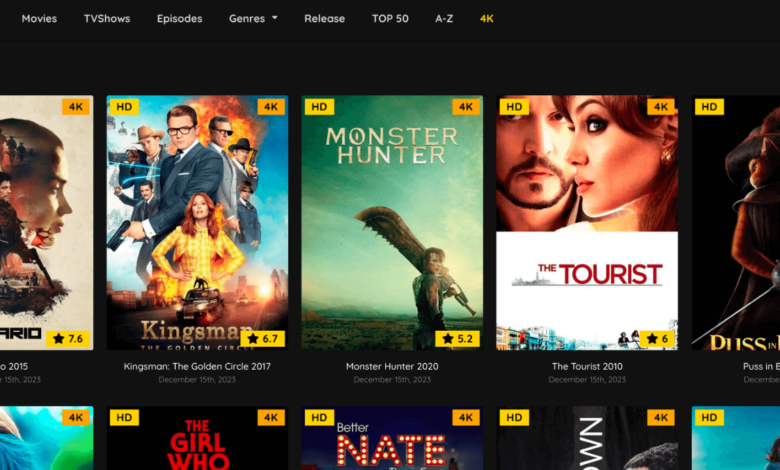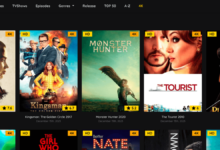OnionPlay Unmasked: The Truth Behind the Free Streaming Giant

Introduction to OnionPlay: More Than Just a Streaming Site
OnionPlay is one of those names that pops up constantly when people search for free ways to stream movies or TV shows online. Whether you’ve stumbled across it trying to watch the latest Hollywood release or heard someone talk about it on a Reddit thread, it’s clear this platform has made a big splash in the digital entertainment world. But what exactly is OnionPlay? Is it legal? Safe? Worth your time? This article dives deep into what is, how it works, why people use it, and everything in between.
At its core, OnionPlay is a streaming platform that provides users with access to a wide range of content—movies, TV shows, documentaries, and even web series. The twist? It does all this without charging a dime. That’s both the appeal and the controversy. While it might sound like a dream come true for budget-conscious streamers, it comes with its fair share of risks and gray areas.
The name “OnionPlay” might also mislead people into thinking it’s part of the Tor (onion routing) network. While some versions of it have been hosted on .onion domains, many of its mirrors and clone sites are accessible directly through regular web browsers, without the need for any special software.
Understanding OnionPlay begins with recognizing the demand it fills. With rising subscription costs on platforms like Netflix, Disney+, and HBO Max, viewers are constantly seeking alternatives. And in a world where piracy has evolved into a sophisticated industry, is one of its most polished players.
The Rise of Free Streaming: Why OnionPlay Gained Popularity
The growth of OnionPlay didn’t happen in a vacuum. It rose alongside a larger trend: the explosion of demand for on-demand content. As more people ditched cable TV in favor of online streaming, the need for easy, instant access to shows and movies skyrocketed. But with that came a problem—cost. Subscribing to five or six different services to access all your favorite content adds up quickly.
This is where free streaming platforms like step in. They cater to a global audience that’s looking for convenience, variety, and above all, affordability. It didn’t take long for OnionPlay to gain traction among students, young adults, and users in countries where premium services are either unavailable or too expensive.
OnionPlay’s interface also helped its popularity. Unlike older torrent-based websites or shady pop-up-filled domains, it offers a clean, user-friendly experience. No logins are required. No software needs to be installed. Just click, stream, and enjoy.
Another key factor was the platform’s vast library. From blockbuster hits to indie favorites, from American sitcoms to Korean dramas—seemed to have it all. And it wasn’t just the quantity but the speed of updates. Often, new episodes or movies would appear on the site within days (or even hours) of their official release.
Add to that a strong word-of-mouth campaign on social media, YouTube, and forums, and you’ve got a recipe for viral success. People love to share a good hack, and quickly became one of the best-known “secrets” in the streaming world.
What Makes OnionPlay Tick: Inside the Technology and Functionality
So, how exactly does work? The short answer: it acts as an aggregator of third-party content. The long answer is a bit more complex and dives into how such platforms technically operate.
OnionPlay itself doesn’t host any movies or TV shows directly. Instead, it provides users with embedded streams or links to external hosting services. These hosts are often located in countries with lax copyright enforcement or operate on anonymous platforms, making it difficult to trace and shut down.
The site acts more like a directory or a search engine than a traditional streaming host. When you click on a title, the backend pings a third-party server that contains the video file and delivers it to your browser using embedded video players. The user thinks they’re watching something “on OnionPlay,” but in reality, they’re viewing content streamed from elsewhere.
To maintain uptime and avoid takedowns, frequently changes domains or runs mirror sites. These domains often have similar names like “onionplay.to”. Some versions may even have secure protocols or be accessible through the Tor network to evade surveillance.
What’s more impressive is how they bypass browser-level blocks and . Through obfuscated code, dynamic scripts, and sometimes advanced redirection methods, can adapt to censorship and blocking by ISPs or governments.
But perhaps the most technically sophisticated aspect is how they monetize. With no subscription fees, OnionPlay depends on ad revenue—mostly from display ads, pop-ups, and in some cases, crypto mining scripts that activate during your session. It’s a fine balance between providing free access and keeping the lights on.
The Legal Gray Area: Is OnionPlay Legal?
This is where things get murky. While OnionPlay doesn’t host the pirated content itself, linking to or embedding it is still considered a violation of copyright laws in many jurisdictions. It operates in a legal gray area that protects it only as long as it remains hard to pin down or prosecute.
In countries like the U.S., the UK, and much of Europe, accessing pirated streams—even through intermediaries like —can technically make users liable. However, enforcement against individual users is rare and usually focuses on those who upload or distribute content rather than those who passively stream it.
Still, it’s worth noting that several governments and copyright watchdogs have taken legal action against sites like . Entire domains have been seized. Hosting providers have been pressured to shut down services. And ISPs have been instructed to block access.
The trouble is, that OnionPlay is highly resilient. Even if one domain is taken down, another pops up within hours. It’s like a game of digital whack-a-mole, and enforcement agencies are often one step behind.
So, while many users feel “safe” using , it’s not without legal risk. Even more concerning is that using such sites often means you’re inadvertently supporting an underground economy that includes malware distribution, data theft, and unlicensed advertising.
The Risks of Using OnionPlay: What Users Should Be Aware Of
While the promise of free streaming is enticing, it’s important to be aware of the risks that come with platforms like OnionPlay. First and foremost: malware. Many of the ads that support come from shady providers. Click on the wrong ad, and you might find yourself downloading a trojan, spyware, or worse.
Another big concern is privacy. Since doesn’t require user accounts, it may seem like it’s protecting your anonymity. But without a VPN, your IP address is visible to both the site and any third-party trackers it uses. That can expose you to everything from targeted phishing to legal notices.
There’s also the risk of phishing scams. OnionPlay’s popularity means that many fake versions of the site exist online. These clone sites look identical but are designed to steal personal information, passwords, or payment details under the guise of “improving streaming quality.”
Furthermore, there’s no content moderation. Unlike platforms like Netflix or Hulu, which curate and vet content, relies on whatever third-party hosts provide. That means you could end up watching low-quality videos, mislabeled files, or even disturbing material without warning.
And if you’re using OnionPlay on mobile? That adds another layer of vulnerability. Mobile browsers often lack the same level of protection as desktop browsers, making users even more exposed to malware, redirect loops, or forced pop-ups.
Lastly, there’s the ethical aspect. Watching pirated content deprives creators, actors, studios, and writers of income. Especially in today’s streaming economy—where creators rely more on direct digital revenue—piracy hits harder than ever.
OnionPlay Alternatives: Legal and Safer Streaming Options
For those who enjoy streaming but want to avoid the shady side of the internet, there are plenty of legal alternatives to that offer great content without the risks. Sure, they might require a subscription, but you get quality, safety, and peace of mind.
- Tubi TV – A free ad-supported streaming service with a vast library of movies and shows. It’s 100% legal and available in many countries.
- Crackle – Sony’s platform that offers high-quality content for free. You’ll see ads, but it’s worth it.
- Pluto TV – A unique service that combines live TV channels with on-demand content, all free.
- Peacock (Free Tier) – Offers a limited selection of shows and movies at no cost, with the option to upgrade.
- Kanopy & Hoopla – If you have a library card, these services let you stream thousands of films legally and free of charge.
- YouTube Movies – Some movies are available for free with ads; others can be rented or bought.
- IMDb TV (now Amazon Freevee) – A decent selection of free titles with minimal ad interruption.
While these services might not have everything OnionPlay does, they offer a better experience overall—without the need to worry about viruses, lawsuits, or shady redirects.
The Future of OnionPlay: What Lies Ahead?
Given the history of streaming piracy, it’s fair to say won’t be around forever—or at least not in its current form. Platforms like this are constantly evolving to stay ahead of copyright enforcers, hosting takedowns, and domain bans. But the pressure is mounting.
Anti-piracy groups are investing more in AI-driven detection, takedown bots, and international partnerships to tackle these sites more aggressively. Big tech companies are also being roped into the fight, with browser developers, search engines, and ad networks working to starve pirate platforms of visibility and income.
Even if survives, its business model might change. There are rumors that some streaming sites are testing subscription-based “premium pirate” models that offer ad-free access or HD streaming for a small fee. That kind of evolution blurs the lines between legal and illegal even further.
Alternatively, OnionPlay could fade away, only to be replaced by more sophisticated successors. Piracy isn’t going away anytime soon—it just adapts. And users should be prepared to think critically about where they stream from, why, and at what cost.
Final Thoughts: Is OnionPlay Worth It?
At the end of the day, is a product of its time. It’s a response to rising costs, content fragmentation, and the global hunger for entertainment. It offers convenience, variety, and zero upfront cost—which is exactly what millions of people are looking for.
But that comes with serious trade-offs. From security risks and ethical dilemmas to legal ambiguity, using OnionPlay isn’t as “free” as it seems. If you’re tech-savvy, cautious, and understand the risks, you might get by without incident. But for the average user? It’s a digital minefield.
If you’re looking for peace of mind and a guilt-free way to enjoy your favorite shows and movies, legal alternatives are well worth exploring. But if you’re still tempted to try , go in with eyes wide open—and a VPN running.
FAQs About OnionPlay
1. Is OnionPlay legal to use?
Not really. While itself doesn’t host content, it links to pirated material, which violates copyright laws in many countries.
2. Can I get viruses from using ?
Yes. Many of the ads and redirects can expose your device to malware, especially if you don’t use an ad blocker or antivirus.
3. Does OnionPlay have an official app?
No. Any app claiming to be “OnionPlay” is likely fake or malicious. Stick to the web version (if you must use it) and be cautious.
4. Why is blocked in some countries?
Governments and ISPs block OnionPlay due to its piracy-related content. VPNs are often used to bypass these blocks.
5. Are there safe, free alternatives to ?
Yes! Tubi, Pluto TV, Crackle, and Peacock’s free tier are excellent legal alternatives that won’t put your device or data at risk.


